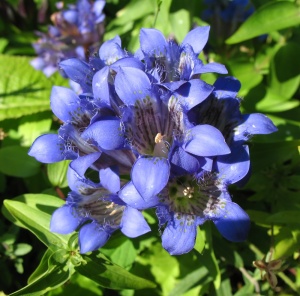Gentiana lutea
| See Also | Botanical Monographs |
|---|
Gentian (Gentiana lutea) is a digestive tonic. To explore the characteristics, medicinal uses and prescribing considerations of this herb in more detail, check out the references indicated.[1], [2]
Contents
Characteristics
- Common Names: Gentian, Yellow gentian, Great yellow gentian, Bitter root, Bitterwort
- Family: Gentianaceae
- Habitat: Gentiana lutea is native to Europe and Asia Minor. It is cultivated in eastern Europe and North America and is common to mountainous pastures and thinly wooded forests. It prefers loamy soils.
- Parts Used: Rhizomes and root
- Constituents: bitter glycosides (amarogentin, gentiamarin), xanthones, phenolic acids, alkaloids, sugars, trace volatile oils
- Medicinal Actions: bitter digestive stimulant (detectable at 1:50,000 dilution), sialagogue, hepatic, cholagogue, febrifuge, tonic, antinausea, antimicrobial, antihelmintic, emmenagogue, antiemetic, antimicrobial, antipyretic,
Uses
Historical Uses:
Dioscorides wrote that Gentiana lutea was introduced into herbal medicine by King Gentius of Illyria (180-167 B.C.). It has been used for cleaning wounds and in aperitifs (served before meals to stimulate appetite).
Medicinal Uses:
- anorexia, atonic dyspepsia, gastrointestinal atony indigestion, flatulence, nausea; strengthens debilitated digestive system, malabsorption conditions including anemia.
Prescribing Considerations
The information provided is intended to augment the treatment from a naturopathic doctor or other trained medical professional. Although most herbs are generally safe, it is recommended that you avoid self-prescribing especially when there is an underlying ongoing medical condition, if you are on any prescription medications or if you are pregnant or breastfeeding.
Formulations and Preparation
- Infusion or Decoction - 0.6-2g or 1/2 tsp per cup
- Tincture - 1-4mL (1:5, 40%) three times daily
Take 15-30 min before meals. Take 40 drops to restart digestion after over-eating.
Safety
The safety and prescribing considerations for this herb include:[3] [4]
- Generally regarded as safe.
- Side-effects are excess stomach acid; may cause headaches.
- Contraindications: stomach irritability or inflammation (empirical); gastrointestinal ulcers (empirical), although may be useful in gastric ulcers associated with atrophic gastritis; pregnancy
- General contraindications for all bitters: do not use bitters in kidney stones, gallbladder disease, dysmenorrhea, gastrointestinal reflux, hiatus hernia, gastritis, or with peptic ulcers
- Drug-Herb Interactions.[2]
- H2-receptor Antagonists or Other Antacids - Gentiana acts as a stomach-acid secreting stimulant therefore the herb antagonizes the action of these drugs.
References
- ↑ Boon Heather, Smith Michael (2009) 55 Most Common Medicinal Herbs: The Complete Natural Medicine Guide Second Edition Institute of Naturopathic Education and Research, CCNM Toronto.
- ↑ 2.0 2.1 Godfrey Anthony, Saunders Paul, Barlow Kerry, Gowan Matt (2011) Principles and Practices of Naturopathic Botanical Medicine, Advanced Botanical Medicine. V3 CCNM Press, Toronto.
- ↑ Stargrove Mitchell Bebell, Treasure Jonathan, McKee Dwight L (2008) Herb, Nutrient and Drug Interactions: Clinical Implications and Therapeutic Strategies.
- ↑ Brinker Francis (1997) Herbal Contraindications and Drug Interactions: Plus Herbal Adjuncts With Medicines, 4th Edition Eclectic Medical Publications.
